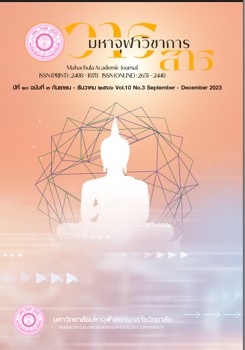Teachers’ Knowledge of Student Learning in Secondary Mathematics Classroom Using Lesson Study and Open Approach
Main Article Content
Abstract
The purpose of this research was to analyze teachers' knowledge of students' learning in secondary mathematics classroom using Lesson Study and Open Approach. The research methods are divided into 2 phases: Phase 1: Participating in a Lesson study team to study the collaboration of secondary mathematics teacher and Phase 2: A study of teachers' knowledge of students' learning. It uses an experimental qualitative research methodology on teaching using Lesson Study and Open Approach. The target group consists of 6 secondary mathematics teachers and 4 Internship students who practice teaching in mathematics at the secondary level, in the academic year 2/2022. Tools used to collect data include field notes about teaching plan, field notes about classroom observations and the field notes about classroom reflecting. Data analysis was performed according to Lesson and open approach by presenting the analysis results by analytical narrative method.
The results showed that (1) Step 1: Collaboratively design lesson plan. The results showed that teachers of lesson study team can understand the mathematics content at the junior high school level enough to implement an effective mathematics teaching plan. Able to create problem situations by considering the real world of students, thus making the problem a student's problem. Able to predict Student concepts that will come up in class, it can also predict Students' ideas for each instruction can be varied. Prioritize student ideas that are expected to emerge in class. Prepare supplementary materials to help expand students' concepts and they can predict where the students' problems or students' misconception will arise during the students' problem solving. (2) Step 2: Collaboratively observing the lesson. The results showed that teachers of lesson study team can observe students' access to task and problem situations, can observe all student ideas emerging in class, grouping student ideas that come up in class, give students the opportunity to present their ideas, connect the students’ idea, compare the students ‘idea. Able to observe students' difficulty, students' misconception, discrepancies in solving students' problems and can use questions to allow students to question their own idea and other ideas. (3) Step 3: Collaboratively reflection on teaching practice. The results showed that teachers of lesson study team can guide the development of commands (Tasks) into the students’ language, can tell students' difficulty, students' misconception, and teachers of lesson study team can reflect on the conceptual grouping of students, grading student concepts, linking Student Concepts.
Article Details

This work is licensed under a Creative Commons Attribution-NonCommercial-NoDerivatives 4.0 International License.
References
ไมตรี อินทร์ประสิทธิ์. การสอนโดยใช้วีการแบบเปิดในชั้นเรียนคณิตศาสตร์ของญี่ปุ่น. KKU Journal of Mathematics Education. ปีที่ ๑ ฉบับที่ ๑ (๒๕๔๗) : ๑-๒๘.
________. กระบวนการแก้ปัญหาในคณิตศาสตร์ระดับโรงเรียน. ขอนแก่น: เพ็ญพริ้นติ้ง, ๒๕๕๗.
Barker, D. D. Teachers’ knowledge of algebraic reasoning: its organization for instruction. Doctoral dissertation, University of Missouri, Columbia, 2007.
Grossman, P. L. The making of a teacher: Teacher knowledge and teacher education. New York: Teachers College Press, 1990.
Keirinkan. Gateway to the future Math 1 For Junior high School. Shinko Shuppansha KEIRINKAN Co.,Ltd, 2013.
Lewis, C. Lesson study: A handbook of teacher-led instructional change. Philadelphia, PA: Research for Better Schools, 2002.
Ma, L. Knowing and Teaching Elementary Mathematics: Teachers’ Understanding of Fundamental Mathematics in China and the United States. Mahwah, NJ: Lawrence Erlbaum Associates, 1999.
Ma’rufi et al. “Exploration of teachers’ knowledge of students’ in study- based teaching on polyhedron material”. Journal of Physics: Conference Series. (2019).
Nohda, N. “Teaching by Open-Approach Method in Japanese Mathematics Classroom”. Proceeding of the 24th Conference of the International Group for the Psychology of Mathematics Education (PME 24). (2000): 39-54.
Olanoff, E.D. Mathematical Knowledge for Teaching Teachers: The Case of Multiplication and Division of Fractions. Doctoral Dissertation, College of Arts and Sciences, Syracuse University, 2011.
Shulman, L. S. Those who understand: Knowledge growth in teaching. Educational Researcher. vol.15 No.5 (1986): 4-14.
Inprasitha, M. Lesson study as an innovation for teacher professional development: A decade of Thailand experience. [ออนไลน์]. แหล่งที่มา: http://www.mathematik.tu-dortmund.de/ieem/bzmu2012/files/BzMU12_0275_Inprasitha.pdf [๑๓ มีนาคม ๒๕๖๓].


